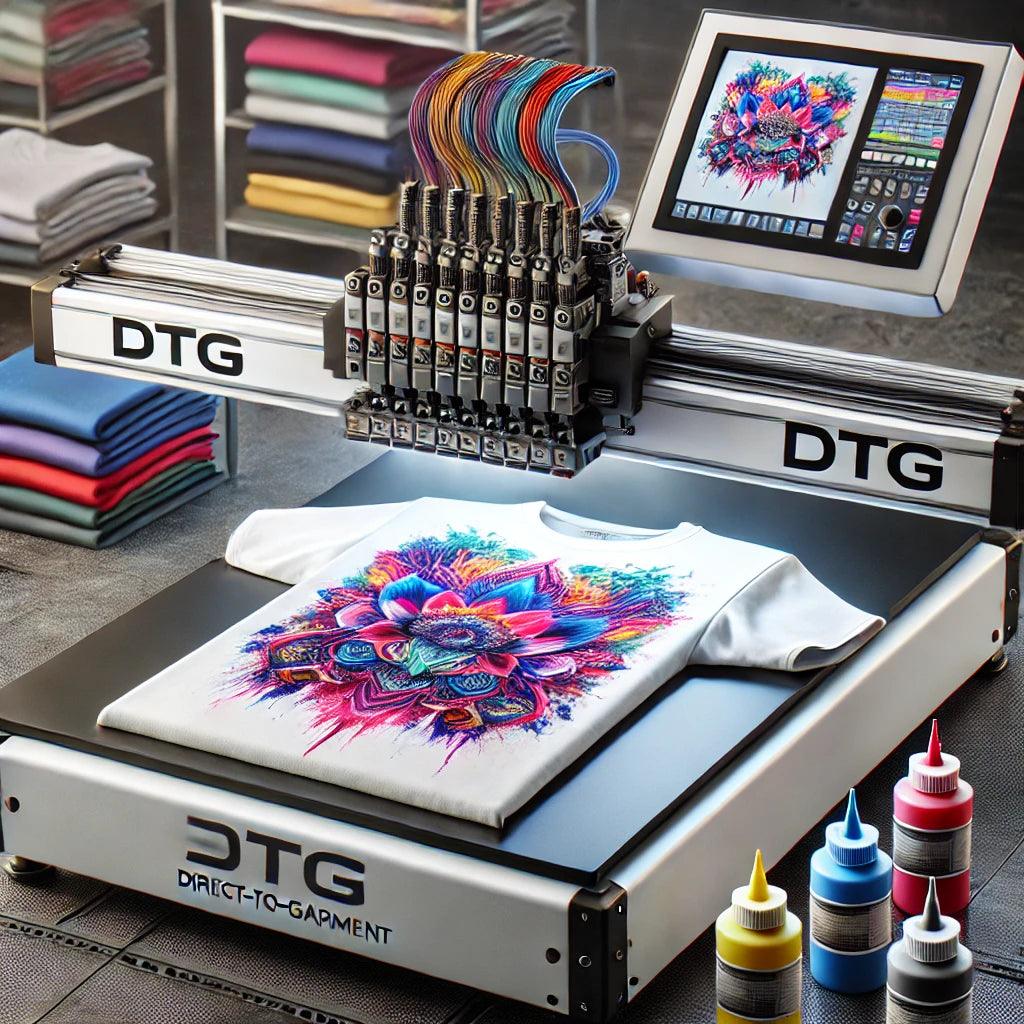
Orders 45$ & Up,
2-3 Days*
Orders 45$ & Up,
2-3 Business Days

TG Printing Machine: Overview and Key Considerations
A DTG (Direct-to-Garment) printing machine allows users to print detailed and colorful designs directly onto textiles, especially on garments like t-shirts, hoodies, and tote bags. If you're considering investing in a DTG printer for your business, it’s essential to understand the different types, popular brands, pricing, and features to look for. Here's an in-depth look at DTG printers to guide your decision.
How DTG Machines Work
1. Pre-Treatment: For dark or colored fabrics, a pre-treatment solution is applied to prepare the surface for printing.
2. Design Upload: A digital design file (usually a PNG or vector) is sent from the software to the printer.
3. Printing Process: The printer sprays ink directly onto the fabric using specialized print heads.
4. Curing: After printing, the fabric needs to be heat-pressed or cured to ensure the ink bonds properly to the garment.
Key Features to Consider
1. Print Quality & Resolution:
- Look for printers with at least 1200 DPI (Dots Per Inch) for detailed, sharp designs.
- Choose machines that print vibrant colors with good CMYK + White ink support (for dark fabrics).
2. Print Speed:
- Faster machines are essential for high-volume production. Print speeds vary, from 1-5 minutes per shirt depending on the design size and complexity.
3. Ink System:
- Some machines use dual CMYK+White ink setups, which are ideal for printing on both light and dark fabrics.
Check if the machine supports water-based inks to ensure eco-friendliness.
4. Fabric Compatibility:
- DTG works best on **cotton fabrics** but some advanced machines can also handle blends, polyester, or other materials.
5. Printer Size & Platen Options:
Consider the maximum print area (e.g., 14”x16”) to ensure it meets your design requirements.
Some models offer interchangeable platens to print on different products (like hats, shoes, or sleeves).
6. Maintenance Requirements:
Regular cleaning cycles are necessary to avoid ink clogging.
Look for machines with auto-cleaning features or closed ink systems for less downtime.
Popular DTG Printing Machine Brands
1. Epson SureColor F2100 / F3070
Known for high-quality prints and reliability.
F2100 is ideal for small businesses, while the **F3070** suits larger production needs.
Features: Auto-maintenance, pre-treatment compatibility, and adjustable platen height.
2. Brother GTX / GTX Pro
Offers high-speed printing and sharp detail, especially for dark garments.
GTX Pro has a bulk ink system, reducing ink costs for large-volume orders.
Features: Large print area and compatibility with multiple substrates.
3. Ricoh Ri 1000 / Ri 2000
Excellent for mid-sized businesses with moderate production volumes.
Features: Color touchscreens, fast print speeds, and quick-change platens.
Ri 2000 offers automated maintenance and improved white ink performance.
4. Kornit Breeze / Avalanche HD6
-Premium industrial-grade machines for large-scale operations.
-Kornit printers support polyester printing and use a built-in pre-treatment system.
-Features: Eco-friendly ink, fast production, and robust maintenance.
5. Omniprint FreeJet 330TX Plus
A versatile machine with great print quality for light and dark fabrics.
Features: Compact size, adjustable platens, and strong after-sales support.
Cost of DTG Printers
Entry-Level DTG Printers: $5,000 – $10,000
Suitable for small businesses or beginners.
Example: Ricoh Ri 100 or Epson SureColor F2100.
Mid-Range DTG Printers $15,000 – $30,000
For medium-sized businesses or those with moderate production needs.
Example: Brother GTX or Ricoh Ri 2000.
High-End Industrial Printers $50,000+
Designed for large-scale operations with bulk printing needs.
Example: Kornit Avalanche HD6 or Epson SureColor F3070.
Pros and Cons of Owning a DTG Printer
Pros vs Cons
High-quality, full-color prints, High initial investment
Suitable for one-off orders, Regular maintenance required
On-demand, eco-friendly production| Slower for bulk production
Supports customization, Requires pre-treatment for dark fabrics
Is a DTG Printer Right for You?
Choose DTG if your business focuses on custom orders, print-on-demand, or small batch printing with complex designs.
Consider alternatives (like screen printing) if you plan to print large quantities with simple designs, as it can be more cost-efficient.
Investing in a DTG printing machine can open new avenues for your business, especially if you value flexibility and detail. However, it’s crucial to consider your production needs, budget, and maintenance capabilities before making the purchase.
Typically ships out in 24 hours 2-3 days shipping time (free shipping) Product Details Premium 4mm Collapsible Slim Can Koozies Holds Most Slim...
View full detailsTypically ships out in 24 hours 2-3 days shipping time (free shipping) Description: Enjoy a cold beer, a spiked seltzer, or your favorite Beer D...
View full detailsTypically ships out in 24 hours 2-3 days shipping time (free shipping) Product Details FREE SHIPPING on this item over $45 Premium 4mm Collapsi...
View full detailsTypically ships out in 24 hours 2-3 days shipping time (free shipping) Product Details FREE SHIPPING on this item over $45 Premium 4mm Colla...
View full detailsTypically ships out in 24 hours 2-3 days shipping time (free shipping) Product Details Premium 4mm Collapsible Slim Can Koozies Holds Most Sl...
View full detailsEnjoy a cold beer, a spiked seltzer, or your favorite Beer Drink flavor while keeping it cold, crisp, and delicious with a QualityPerfection can co...
View full detailsTypically ships out in 24 hours 2-3 days shipping time (free shipping) Product Details Premium 4mm Collapsible Slim Can Koozies Holds Most Slim...
View full detailsSamples - Might be with colors defects or print, We choose them randomly. Neoprene and foam are not the same shades of colors. The price is for 100...
View full detailsTypically ships out in 24 hours 2-3 days shipping time (free shipping) Product Details Premium 4mm Collapsible Slim Can Koozies Holds Most S...
View full details3 Magnets Slim can cooler sleeves FREE SHIPPING on this item over $45 Premium 4mm Collapsible Slim Can Coolers Holds Most Slim 12 oz. Cans Col...
View full details
Leave a comment